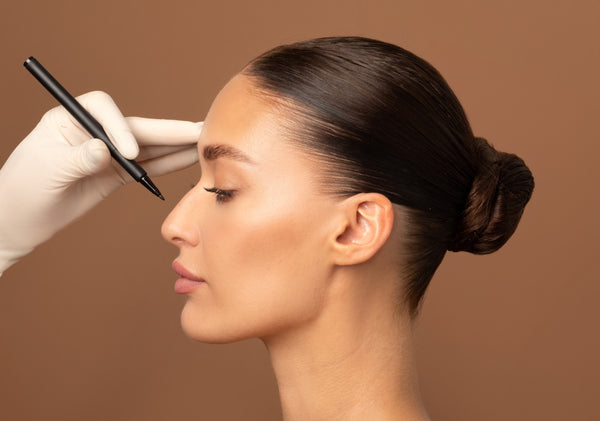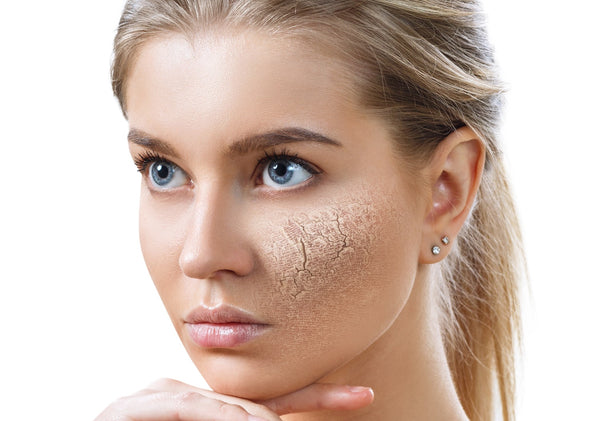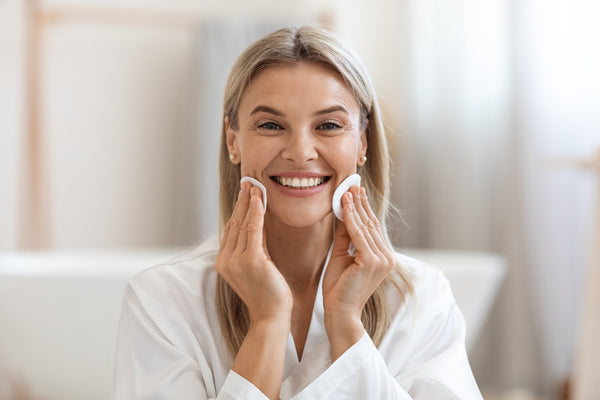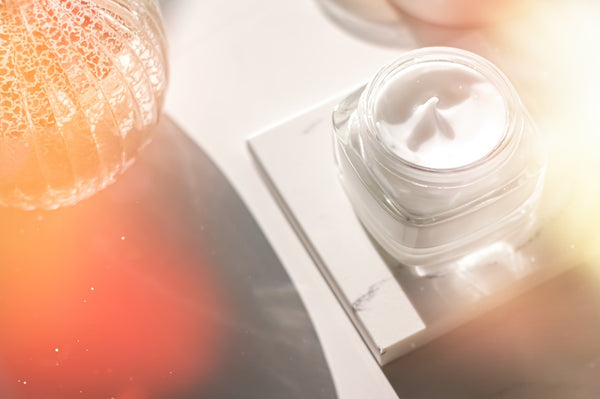What Is Your Skin Type? How To Take Care Of It?

What Is Your Skin Type?
You might have heard of different skin types, such as dry, oily, sensitive, and normal skin, but have you ever wondered which skin type category you belong to? Skin types can also change over time. This mostly shows as you get older and your skin starts changing. Our skin loses its density and volume as we age, and sometimes wrinkles appear.
Our ethnicity and skin color also affect how our skin reacts to forces of nature, like the sun and other pigmentation disorders. Redness can help identify skin conditions like rosacea.
So what is the difference between these skin types? The skin type you have is dependent on the following things:
- The sensitivity of your skin
- How much water your skin has (this affects comfort and elasticity)
- The oiliness of the skin (oiliness affects how soft it is)
Regardless of the type of skin you have, all skin types could benefit from healthy skin care routines. However, the needs will vary depending on the skin type as each skin type requires different skincare routines.
If you want to take great care of your skin, you should understand your skin type first. Let us look at some common types of skins and how to take care of them.
7 Skin Types and How to Take Care of Them
- Normal Skin
- Oily Skin
- Dehydrated/Dry Skin
- Combination Skin
- Acne-Prone Skin
- Mature Skin
- Sensitive Skin
 Individuals with this type of skin rarely get any breakouts, which means they have few adverse reactions to weather or new products. There is also little need to put oil on your face every day or apply moisturizer now and then. Normal skin is firm and has fewer wrinkles and fine lines.
Individuals with this type of skin rarely get any breakouts, which means they have few adverse reactions to weather or new products. There is also little need to put oil on your face every day or apply moisturizer now and then. Normal skin is firm and has fewer wrinkles and fine lines.
When it comes to taking care of normal skin, it is easy, as you can use most of the products out there. You won't have to worry about oiliness, dryness, or sensitivity. This means you have various beauty products at your disposal. You can experiment with masks, moisturizers, and cleansers to find what works best.
People with this type of skin usually notice their skin always glowing. Their makeup also tends to be affected and dislodged or fails to remain in the position they were applied.
Oiliness is caused by an overactive sebaceous gland that produces a lot of sebum, thus resulting in enlarged pores and an oily T-zone. People with this type of skin experience breakouts often courtesy of moisture.
Taking care of the shine is a concern regarding oily skin. However, some people don't mind oily skin because it usually also means fewer wrinkles.
If you want to reduce the oily layer on your skin, you can try products that contain alcohol, petroleum, and mineral oil. Also, look for non-comedogenic products; these work best for oily skin because they don't clog up pores. Oil-free moisturizers are also an excellent place to start.
 Although most people are unaware, dehydrated skin and dry skin are different. Their symptoms, however, are similar. Dehydrated skin is when not enough moisture is retained in your skin, thus causing your skin to feel tight. You may notice small fine lines when you pinch your skin together.
Although most people are unaware, dehydrated skin and dry skin are different. Their symptoms, however, are similar. Dehydrated skin is when not enough moisture is retained in your skin, thus causing your skin to feel tight. You may notice small fine lines when you pinch your skin together.
On the other hand, dry skin results from a lack of oil in the skin. The symptoms of dry skin include cracks and itchiness. Sensitivity and flakiness may also be present. Low production of sebum is the cause of dryness in the skin. It usually results from a chronic condition or lifestyle and environmental factors.
Water-based products are your best friend when dealing with dehydrated skin. You should keep off oil-based products as they can worsen the problem. Drinking enough water every day will also help with dehydrated skin.
On the other hand, rich moisturizers are your go-to when dealing with dry skin, as they aim to seal in moisture. Apply your moisturizer after taking a shower or cleansing your hands. Keeping the air moist and warm will also help in healing your skin. Keep off products that contain a lot of fragrance and harsh soaps.
If you have difficulty figuring out the type of skin you have, then maybe you may want to check if you have a combination skin type. For instance, you can have a combination of dry and oily skin types. You might have some areas of your skin dry and others oily. In most occasions, it is the oily T-zone which is the area across your forehead along to your nose, and the dry part is usually the rest of the face.
Caring for combination skin can be tricky, and you might have to avoid the ingredients commonly mentioned for oily and dry skin. The trick is to balance your skincare routine. This means isolating the areas on your face and going for spot treatment. Balancing cream and toners can be used to even out your skin.

Skincare can be challenging if your skin keeps on having breakouts or your pores tend to clog quickly. This increases the chances for pustules and whiteheads compared to the other skins.
People with dry and oily skin can have acne-prone skin. However, before we proceed, a quick disclaimer: Some blemishes on your skin might not be acne, even though they have the same symptoms. In most cases, it is "adult acne" and is characterized by burning or stinging, thickened skin, and flushing.
Skin care tips for acne-prone skin are mainly about doing anything to minimize the breakouts. This includes using cleansers that treat acne and even moisturizers and exfoliants. In addition, you should gently clean your face to avoid worsening the breakouts.
Topical gels can be used in lightening and treating acne scars. Retinol, Benzoyl Peroxide, clay, and salicylic acid are some ingredients you should look for to help fight acne.
Every person's skin ages at different speeds, but if you have mature skin, you might readily notice it, as the signs are pretty standard. This looks like dryness or wrinkles compared to when you were younger. If your skin is more mature, the symptoms might be more intense, including dehydration, dullness, dark spots, and sagging.
For this one, you might need thorough skincare that aids in future and past damage. One that is particularly common involves restorative treatments in an anti-aging routine. This will help in boosting collagen and protection from cell turnover and environmental aggressors.
Several things can cause sensitive skin, including environmental factors, allergies, or genetics. There are signs you can look out for to determine if your skin is sensitive or not. For example, if your skin flushes easily or is prone to having bumps and rashes, then there are high chances you fall under the sensitive skin category.
Other signs can be burning or having a stinging sensation when you use a skincare product or having a bad reaction whenever you use certain fragrances. Your skin may also be flaky and dry if it is sensitive.
If you have sensitive skin, you might have to pay more attention to your skin, especially when selecting the different types of cosmetics. This is essential because your skin often stings, burns, and gets irritated. You are also better off avoiding irritants like alcohol, fragrances, or any with antibacterial ingredients.
When you are choosing cosmetics, go for the ones with fewer additives, such as products with anti-inflammatory and calming properties. Another thing to remember is that using the wrong products for your skin can make it sensitive even if initially it did not categorize as sensitive.
How to Determine Your Skin Type 
A skin type test is necessary to determine which category you fall under; There are different tests you can try out, all of which should offer reliable results. The following are some of them:
- The Bare Face Method
- Using a Blotting Paper
This method requires no skin care products and is relatively straightforward. You begin by washing your face with a mild cleanser and then gently patting the face using a towel. Do not apply any treatments, serum, or moisturizer afterward. Let your face be for 30 minutes, then check your cheeks, forehead, and T-zone. Look out for dry patches, shine, redness, or oiliness.
Whichever way your skin reacts will tell you what your skin type is. Tightness or feeling uncomfortable indicates dry skin. A shiny look indicates oily skin. The results can also be both if your T-zone looks oily and your cheeks experience some tightness. Any form of irritation or redness means you have sensitive skin.
For the best and most accurate results in determining your skin type go for the blotting paper test. The process is straightforward and has fewer steps. First, ensure you use different sheets of paper for every part of the face. Gently pat them on the nose, chin, cheeks, and forehead. You then hold them close to the light and analyze the results. Minimal oil on the parts of the skin you have tested indicates dry skin. Normal skin is indicated by the nose and forehead being oilier. However, if the entire sheet contains oil, your skin type is oily.
Does Skin Care Matter? Do I Need to Know My Skin Type? 
Skincare is important, especially when figuring out which cosmetics and other skin care products you want to purchase. Knowing your skin type is essential in figuring out the feel of your skin and how you want it to look. For example, what is your skin complexion? Does it ever burn?
You might also have goals for your skin. For instance, you may be trying to go for a youthful look and are working on preventing premature aging. Having dark circles under your eyes or acne is another reason you need to know your skin type and understand it to get what you need.
Some personal habits might also need looking at as they might be the reason your skin is in poor condition. For example, do you smoke or get too much sun exposure? What goes into your diet? What you put inside your body is equally important. Do you take vitamins or eat a balanced diet? All this plays a role in the overall health of your skin.
Once you have the answers to all these questions, it becomes easier to develop a skincare routine. You could also ask for assistance from a professional, particularly a dermatologist, who will be in a more significant position to offer recommendations for your needs.
Skin Care Basics
Regardless of your skin type, there are tips you can follow that will help you look even better. The following are some of the essential skin care tips that are sure to take your skin health to the next level:
- If you are going to go out in the sun, wear sunglasses and a hat and avoid being in direct sunlight.
- Put on sunblock; not just any sunblock but broad-spectrum that is efficient in blocking out UVA and UVB light rays.
- Moisturize your skin regularly
- Quit smoking
- Drink lots of water
- Cleanse your skin every day, but do so gently. If you put on makeup regularly, clean it before bed.
Conclusion
Different people have different skin types, and each skin type has a specific way it should be cared for. Although most people don’t know their skin type, hopefully, this article has helped shed light on the topic and how to identify your skin type and care for it.
Despite your skin type, standard skincare practices will benefit your skin. This includes healthy habits like drinking plenty of water and moisturizing regularly. Cutting off bad habits like smoking also helps keep your skin healthy.
If the challenge is mature skin, there are therapeutic routines you can adopt to assist in giving you that youthful look. External and internal factors such as stress, medications, and hereditary factors also affect your skin's appearance. Lastly, when purchasing skin care products, try and get the ones that match the skin care condition too.









